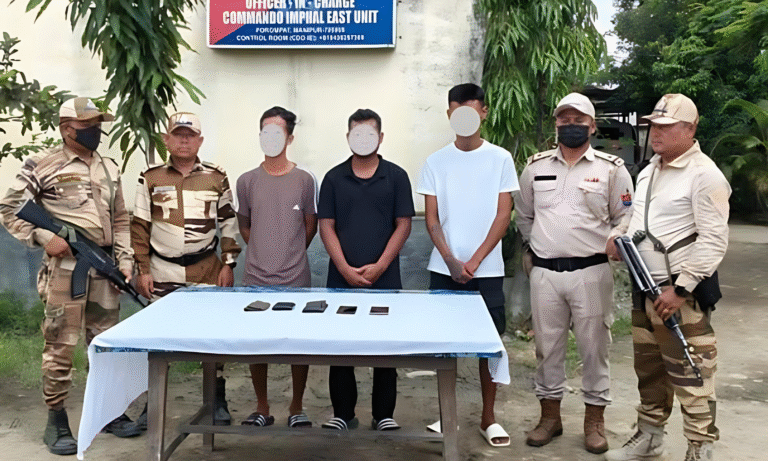Manipur MP Raises Concerns Over Parliamentary Oversight on Insurgent Group Agreements
In a recent development, a Member of Parliament (MP) from Manipur has voiced apprehensions regarding potential infringements on parliamentary rights. The MP alleges that questions pertaining to agreements with insurgent groups were removed from parliamentary proceedings, raising concerns about transparency and oversight.
Unpacking the Allegations: Parliamentary Oversight and Insurgent Agreements in Manipur
Manipur, a state in northeastern India, has long grappled with insurgency and ethnic tensions. The recent allegations by a Manipur MP about the removal of questions related to insurgent group agreements from parliamentary records have sparked debates on transparency, governance, and the delicate balance of power.
The Heart of the Allegations
The crux of the MP’s concerns lies in the alleged omission of questions related to agreements with insurgent groups from parliamentary proceedings. This move, according to the MP, undermines the fundamental principles of parliamentary democracy by restricting elected representatives’ ability to seek information and hold the executive accountable.
The Context: Insurgency in Manipur
To understand the gravity of these allegations, it’s essential to delve into the backdrop of insurgency in Manipur.
- Historical Roots: Manipur has witnessed insurgent activities for decades, with various groups advocating for autonomy or independence. These movements have been fueled by ethnic identities, perceived neglect, and aspirations for self-determination.
- Government Responses: In response to insurgent activities, both the central and state governments have engaged in dialogues, leading to Suspension of Operations (SoO) agreements with several groups. These pacts aim to bring militants into the mainstream through negotiations and developmental initiatives.
Parliamentary Oversight: A Pillar of Democracy
In a democratic setup, parliamentary oversight ensures that the executive remains accountable to the legislature and, by extension, to the people. MPs have the right to question government actions, seek clarifications, and debate policies. The alleged removal of questions pertaining to insurgent agreements raises critical issues:
- Transparency: Such omissions can be perceived as attempts to withhold information from the public domain, leading to suspicions and eroding trust.
- Accountability: Without open discussions, the government’s decisions regarding insurgent groups may lack scrutiny, potentially leading to policies that don’t reflect the populace’s best interests.
The Delicate Nature of Insurgent Agreements
Agreements with insurgent groups are inherently sensitive. They involve negotiations that can impact national security, regional stability, and the lives of citizens. While confidentiality is sometimes necessary during negotiations, once agreements are finalized, they should be subject to parliamentary scrutiny to ensure:
- Legitimacy: Parliamentary discussions can validate the agreements, ensuring they have the backing of the people’s representatives.
- Inclusivity: Debates can bring diverse perspectives, ensuring that the agreements address the concerns of all stakeholders.
Potential Implications of the Allegations
If the MP’s allegations hold water, several implications arise:
- Erosion of Democratic Norms: Sidestepping parliamentary oversight can set a precedent, weakening the foundations of democratic governance.
- Public Distrust: Lack of transparency can lead to public skepticism about the government’s intentions and actions, especially in conflict-sensitive regions like Manipur.
- Policy Gaps: Without rigorous debates, policies stemming from insurgent agreements might be ill-informed or lack comprehensive solutions to underlying issues.
The Way Forward
Addressing these concerns requires a balanced approach:
- Ensuring Transparency: While certain details may need confidentiality, the broader aspects of agreements should be disclosed to the public and discussed in parliament.
- Strengthening Oversight Mechanisms: Parliamentary committees can be empowered to review sensitive agreements, ensuring they align with national interests.
- Engaging Stakeholders: Involving local communities, civil society, and experts in discussions can lead to more holistic and accepted solutions.
Conclusion
The allegations by the Manipur MP shed light on the intricate balance between national security and democratic transparency. While dealing with insurgent groups necessitates a degree of discretion, it should not come at the cost of sidelining parliamentary oversight. Upholding democratic principles ensures that solutions to conflicts are not only effective but also just and inclusive.
FAQs
- What are Suspension of Operations (SoO) agreements?
- SoO agreements are ceasefire arrangements between the government and insurgent groups, aiming to pave the way for peaceful negotiations and integration into the mainstream.
- Why is parliamentary oversight crucial in insurgent agreements?
- It ensures that such agreements are transparent, accountable, and in line with the public’s interests, preventing potential misuse of power.
- Can certain details of insurgent agreements remain confidential?
- Yes, while operational specifics might require confidentiality, the overarching terms and objectives should be subject to parliamentary scrutiny.
- How can the government balance national security and transparency?
- By sharing essential information with parliament and the public while safeguarding sensitive operational details.
- What role do local communities play in insurgent agreements?
- Their involvement ensures that the agreements address ground realities, garner local support, and lead to sustainable peace.



